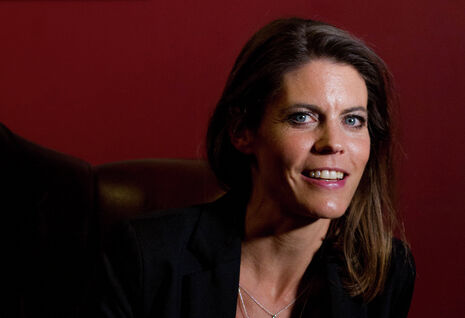‘This is your life. Run your own race’
There were mixed reactions to Liz Fraser’s Union speech, which tackled the psychological challenges unique to Oxbridge.

Cambridge University exists to nurture minds, yet the decline in mental health among some students remains one of the questions it has struggled to resolve.
Despite divided views within the professional and public spheres, it is still taken as a fact that one in four people will suffer a mental health problem, indirectly affecting almost everyone. The reality for Cambridge is believed to be a greater figure.
Liz Fraser – a comedian, social commentator and Clare College alumna – returned to Cambridge on Tuesday to deliver an equally hard-hitting set of solutions, as well as discussing the institution that posed her the toughest intellectual and psychological challenges.
In a poignant talk at the Cambridge Union, the Natural Sciences graduate argued for the reinvention of mental wellbeing as a universal issue so that society might open up to mental illness. “We need to rebrand mental health completely,” Fraser told members. “It is an unfortunate term that makes us think of madness and weird people. The truth is that everybody is abnormal, therefore we are all normal.”
When Fraser asked the audience whether anyone had never felt panic, depression, anxiety or forms of stress, the debating chamber descended into a rare silence.
A particular danger of Oxbridge environments, she cautioned, is the false sense of security given by the collegiate system. “You can literally disappear if you want. Cambridge can be so lonely and this does not help perceived mental health.”
Fraser, who specialised in psychology and neuroscience while at Cambridge in the early 1990s, recalled her own experience with anorexia and mixed comedy with cautionary tales. “I lost weight, I lost focus, it was hard to see. I walked up to the Senate House board and didn’t see my name beside the 2:1s. It turned out I was on the board on the other side of the building for the really, really bad people,” she joked. “And yet, my friends from Clare still had no idea about my illness.”
She added this observation to the practice of students exaggerating the extent of their workload, or lack thereof, as a further example of the intensity in Cambridge. “Don’t believe what anybody around you says. ‘I’ve done no work’ – bullshit. This is your life. Run your own race,” she recommended. “There is a genuine increased pressure at Cambridge, so don’t feel guilty about sensing it. If mental illness affects one in four people in the world, it is probably closer to 30-40 per cent here.”
Confronting the likelihood that every student will know a sufferer of anxiety, Fraser seemed to advocate adopting a hard-line approach to friends. “There are two schools of thought: one is to continue to be nice, and the other is to say, ‘I’m out’. The second method carries high risk but everyone has their turning point.”
“The onus is on you to recognise that you’re not feeling okay,” she added. “You have to decide that you’re going to change things and you can’t blame the world.”
An author of books such as Lifeshambles and The Yummy Mummy’s Family Handbook, Fraser recently founded the website, Headcase, which claims to be “beautiful, sexy, clever, funny, occasionally downright rude” and aims to “change the face of mental health”.
The project is not without its critics, however. CUSU-GU Welfare and Rights Officer, Sophie Buck, said she was “sceptical of the ‘stylish’ Headcase endeavour Fraser is proposing”, and that “Its focus on making mental health ‘sexy’ trivialises what can be exhausting, frightening and disabling experiences of mental health problems.”
Buck also took issue with how Fraser “puts too much focus on individual responsibility for one’s own health”, saying: “It’s important for service providers to make their services accessible, for tutors and DoS to be checking in with their students, for supervisors to set clear expectations for work and, on broader levels, for systematic oppressions to be reduced, and trauma prevented. These relate to mental health, but are by no means the fault of the individual and their ability to self-care or self-refer.”
Student Minds president, Keir Murison, was more forgiving in his appraisal of Fraser’s address, “Liz had some very important messages about self-help and taking responsibility for your own health. There were some messages we disagreed with (the SMC committee present) but there is no right answer when it comes to mental health treatment. We aim for flexibility and understanding from all parties in life to get the best outcome for everyone”
 News / Local business in trademark battle with Uni over use of ‘Cambridge’17 January 2026
News / Local business in trademark battle with Uni over use of ‘Cambridge’17 January 2026 News / Cambridge bus strikes continue into new year16 January 2026
News / Cambridge bus strikes continue into new year16 January 2026 Comment / Fine, you’re more stressed than I am – you win?18 January 2026
Comment / Fine, you’re more stressed than I am – you win?18 January 2026 News / News in Brief: cosmic connections, celebrity chefs, and ice-cold competition18 January 2026
News / News in Brief: cosmic connections, celebrity chefs, and ice-cold competition18 January 2026 Film & TV / Anticipating Christopher Nolan’s The Odyssey17 January 2026
Film & TV / Anticipating Christopher Nolan’s The Odyssey17 January 2026









